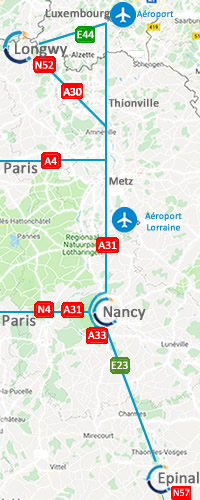ABADIA BERMEO Sofia
ABATA Emilio Norberto
ABDOUN Liza
ABDOUNI Ilias
ABERKANE Samir
AGUILERA GARRIDO Aixa Maria
AIT ESSI Oumaima
AL HAJ ALI Jana
ALMA Marouane
AMOUROUX Marine
AREZKI Hasni
AUBRUN Christophe
AUBRY Alexis
AUBRY Jean François
AUDINOT Norma
AUDOUX Kevin
BACQUET Cyril
BAILLY Yann
BAINIER Gustave
BAJIC Eddy
BARBERI HEYOB Muriel
BARI Imen
BASTOGNE Thierry
BATTAGLIA Shyue Fang
BERNATEAU Sylvain
BESANCENOT Vanessa
BESSAFA Hichem
BETZ Margaux
BIEDA NANDA Rena Royce
BLANCHARD Léa
BLEEKER Mathilde
BLIND Sarah
BLONDEL Walter
BOLOTINE Lina
BOMBARDIER Vincent
BORSOI Ricardo
BOUGHERARA Selsabil
BOUHADJRA Dyhia
BOUKHOBZA Taha
BOURA Cédric
BOURA Marylène
BOURNY Quentin
BOUTAT BADDAS Latifa
BOUTAYEB Mohamed
BRIE David
BRIL EL HAOUZI Hind
BRINZEI Nicolae
BRIOT Tristan
BRUNNER Emilie
CAMONIN Marie
CARDOSO BARRETO Saulo
CARRENO MOSQUEIRA Cristobal
CARRIEROU Amélie
CAVARE Pierre
CERVELLIN Olivier
CHARPENTIER Patrick
CHASTAGNER Pascal
CHATEAU Alicia
CHENG Zihou
CHNIB Echrak
CICEKLI Sevra
CLEMENT DUCHENE Christelle
COLLE Blaise
COLLIN Floriane
COLNET Virginie
COURTADE Théo
COUTHURES Anthony
CREUSOT Roumane
DAAFOUZ Jamal
DAOUK Joël
DAROUACH Mohamed
DAUL Christian
DAVID Michael
DE BRUSSE Jonathan
DELATTRE Cédric
DELCONTE Alain
DEMESURE Guillaume
DERIGENT William
DIRHEIMER Luca
DIVOUX Thierry
DJERMOUNE El Hadi
DO Van Phuc
DOLIVET Gilles
DORR Valérie
DRISSI Ayoub
DUBOIS POT SCHNEIDER Hélène
DUMOND Hélène
DUVERGER Eliott
ECHABARRI Soufian
EL WANNY Nadine
ESLAMI Yasamin
ESPINOSA LOERA Ricardo Abel
FACCIN Faustine
FAIVRE Béatrice
FARKANE Ayoub
FAUVEL Clément
FELPIN Julie
FERREIRONE Mariano Julian
FLAMANT Julien
FLAMENT Stéphane
FONTE Christophe
FRANCIOSI Chiara
FRANCOIS Aurélie
FROUX Aurane
GAFFINET Ben
GAGAN Gagan
GANTNER Alice
GARNIER Hugues
GAUDEAU Yann
GAUTHEY FRANET Eliott
GEORGES Jean Philippe
GIACCAGLI Mattia
GILSON BAGREL Marion
GRAINDORGE Paul Henri
GRANDEMANGE Stéphanie
GRANJON Yves
GREZES Teddy
GRILLIER VUISSOZ Isabelle
GROSSO Maxime
GUEDJALI Rachid
GUILLET THIBAULT Julie
HAGEN Simen
HAMDI CHERIF Sarah
HAMELIN Frédéric
HARLE Alexandre
HARLE Guillaume
HAZZAMI Mohamed Amine
HEFIED Yacine Khalid
HEQUET Gael
HERNANDEZ VALDELAMAR Hernando
HOUESSOU Narech
HUSSON Marie
INCERTI Anne
ISMAILI ALAOUI Abir
IUNG Benoît
JACQUES Corentin
JAIN Tushar
JHA Mayank Shekhar
JOIN Cédric
JOLY Heloïse
JOUAN HUREAUX Valérie
JUNGERS Marc
KALLAS Maya
KANSO Soha
KHALIL Mira
KHERBACHE Mehdi
KICKENS Antoine
KOLA Kristiana
KORDIIAKA Yuliia
KREISS Jérémie
KROMMENACKER Nicolas
KUNTZ Sandra
KUPRIYANOV Valentin
LACROIX MALGRAS Victorine
LAMOTTE Anne Sophie
LAMY Laureline
LASAULCE Samson
LASSALLE Henri Pierre
LAURAIN Vincent
LAZAR Martin
LE Huu Truong
LE CAM Steven
LECUIRE Vincent
LEPAGE Francis
LEPRINCE Dominique
LEROUGE Lucie
LEROUX Agnès
LEUTWYLER Nicolas
LEVRAT Eric
LEZOCHE Mario
LICITRA Letizia
LIU Yinling
LOHEAC Jérome
LOPEZ TIRO Francisco Javier
LORENZETTI Pietro
LOUAIL Lemia
LUO Runkun
MAIMOUR Moufida
MAQUIN Didier
MARANGE Pascale
MARCHAL Frédéric
MARTHI Satya Vinay Chavan
MARX Benoît
MASONI Jennifer
MASTRONICOLA Romina
MAURICE Gautier
MAZA Samia
MAZERBOURG Sabine
MENG Shengya
MERLIN Jean Louis
MICHEL Cassandra
MILLERIOUX Gilles
MIRON Sebastian
MOHAMAD Hassan
MONGAILLARD Thomas
MORARESCU Irinel Constantin
MOUREAUX Jean Marie
MOUROT Gilles
NAANAA Haya
NAJJAR Salma
NAOUMI Séfana
NEYBECKER Camille
NGUYEN Quang Huy
NOURDIN Marie Sophie
ORTIZ Paul
PANETTO Hervé
PANNEQUIN Rémi
PAOLI Justine
PERRIN MOZET Clarice
PETIN Jean François
PHULPIN Bérangère
PHULPIN Suzy
PIERRON Aurélien
PIERSON Christine
PIERSON Julien
PINEAU Sofiane
PINEL Sophie
PLENAT François
POIRE Romain
PONSART Jean Christophe
PORROVECCHIO Apolline
POSTOYAN Romain Khorene Yves
RAFARALAHY Hugues
RANTA Radu
RECH Fabien
RICHARD Edouard
RIEDINGER Pierre
RISSE Léo
RONDEAU Eric
ROUGET Raphaël
ROUYER Marie
RUIZ AMANTEGUI Jorge
RUP Clément
RUTSCHKE Théo
SAIDI Karima
SANTEJUDEAN Tudor
SATHEESKUMAR VARMA Vineeth
SAUTER Dominique
SAUTEREAU Martin
SCHIAVI TRITZ Jessica
SCHNELLER Perrine
SCHOHN Hervé
SEILER Priscillia
SHEIKHKHOSHKAR Moslem
SHQAIRAT Ala'a
SIMON Christophe
SOULEY ALI Harouna
SUHNER Marie Christine
TAILLANDIER Luc
THAI Nguyen Trung Thanh
THEILLIOL Didier
THOMAS Katia
THOMAS Noémie
THOMAS Philippe
THOMASSIN Magalie
USEVICH Konstantin
UWADUKUNZE Alain
VALENTIM VIANA Valessa
VANSON Gautier
VAZQUEZ TREJO Jesus Avelino
VERNEREY Flora
VOISIN Alexandre
WEBER Philippe
WITZ Andréa
WOLF Didier
YAME Joseph Julien
YOUSSEF Charbel
ZASADZINSKI Michel
ZAYTSEV Sergey
ZEMOUCHE Ali
ZERGA Mohammed El Hadi
ZIMMERMANN Emmanuel
ZOUAOUI Abdelhakim






